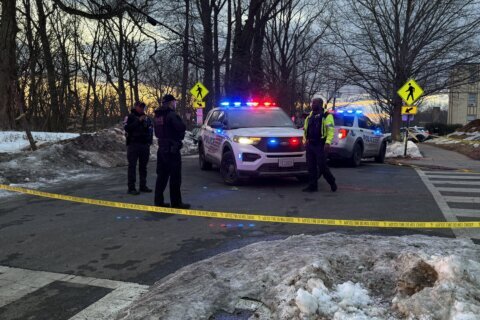Residents of D.C.’s Van Ness neighborhood in Northwest gathered Monday evening, at the invitation of their Advisory Neighborhood Commissioners, to discuss this past Friday’s mass shooting that left four people hurt — two of them critically.
There was concern about this past Thursday’s domestic violence incident where a woman jumped from an 8th floor apartment to escape her attacker, among other violent incidents in the area.
Folks who live in the neighborhood expressed concerns to ANC commissioners about violent crime and about building owners who, they say, didn’t heed their calls for cameras and security until after Friday’s mass shooting incident.
The District 2 police commander, Ward 3 Council Member Mary Cheh and representatives from various D.C. agencies joined the neighborhood representatives at the gathering.
Even though safety was top of mind, “Many of the concerns that were shared today were not police related,” said Cmdr. Duncan Bedlion, of D.C. Police District 2.
Those concerns included the lack of cameras and security at apartment and condo buildings.
“That is a front-line thing that the ANC can absolutely, 100% bring pressure to bear,” said Dipa Mehta, ANC 3F-03.
The conversation was multilayered and spanned from worries about violence to absentee landlords who accept residents with housing vouchers.
“We’re talking about violent crime, in terms of the active shooter, and we’re talking about systemic issues that have happened across D.C., which is why we need the voucher program in general,” said ANC 3F-02 Alex Appah. “This is a really, really multilayered issue that is not going to be solved by one institution or one policy.”
Concern was expressed that more needs to be done to adequately support vulnerable populations who live in the community.
“There is a construct that we can put in place that would enable us to be open and welcoming to people who need a place to stay — but also to deal with people who come into the buildings and have serious clinical problems,” Cheh told the group.
In addition to that, Cheh said there should be tighter requirements for landlords, especially absentee landlords, to abide by for them to continue receiving residents who use housing vouchers and the money that comes with those vouchers.
Cheh had the following suggestions: If a building has “so many calls for service, you have to have a security guard,” she said.
“You have to tell these landlords that unless they enforce the provisions of the lease, that they’re off the list for getting voucher residents,” Cheh said, those words met with applause.
“There are things that are not criminal, but they destroy the quality of life. If you’re not supposed to smoke in the buildings, you shouldn’t be able to smoke in the buildings. You shouldn’t be able to panhandle outside of the buildings,” Cheh said.
“Or inside the buildings,” someone shouted.
“Or inside of the buildings,” Cheh echoed. “And people have had their clothes stolen from the laundry room, stuff like that. If that’s what’s going on in a building and the landlord doesn’t attend to it, then the landlord [should be] on the list of not getting any more voucher residents,” Cheh said.
Other layers to the discussion included a reminder that needs vary among individuals who live in neighborhood apartments with the assistance of vouchers. Some are experiencing a temporary setback due to a job loss, for example, while others may have been chronically homeless and could have other challenges linked to that homelessness such as drug addiction or mental illness.







